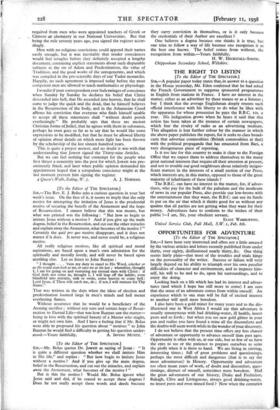THE RIGHT TO LISTEN
[To the Editor of THE SPECTATOR.] SIR,—A popular paper today states that, in answer to a question in the House yesterday, Mr. Eden confessed that he had asked the French Government to suppress sponsored programmes in English from stations in France. I have no interest in the matter, either as an advertiser by these means or as a listener ; but I think that the average Englishman deeply resents such official interference with his liberty to do what he likes with the apparatus for whose possession he pays the B.B.C. ros. a year. His indignation grows when he hears it said that this action has been taken at the instance of certain newspapers, which fear the rivalry of radio as an advertising medium. This allegation is lent further colour by the manner in which the above paper publishes the report, for it seeks to class broad- casts that advertise commodities (British commodities at that) with the political propaganda that has emanated from Bari, a very disingenuous piece of reporting.
Is it too late for this country to make it clear to the Foreign Office that we expect them to address themselves to the many great national interests that require all their attention at present, and not to trouble our good neighbours about relatively insigni- ficant matters in the interests of a small section of our Press, which interests are, in this matter, opposed to those of the great majority of inhabitants of these islands ?
The B.B.C. can have no interest in the matter, for, if adver- tisers, who pay for the bulk of the pabulum and the modicum of news in our popular Press, also provide our low-brows with the entertainment that they want, the B.B.C. can use its funds to put on the air that which it thinks good for us without any qualms that all parties are not getting what they want for their money. Advertisers have to conform to the wishes of their public !—I am, Sir, your obedient servant,
ELIOT WARBURTON.
United Service Club, Pall Mall, S.W. x, Feb. 8th.


















































 Previous page
Previous page